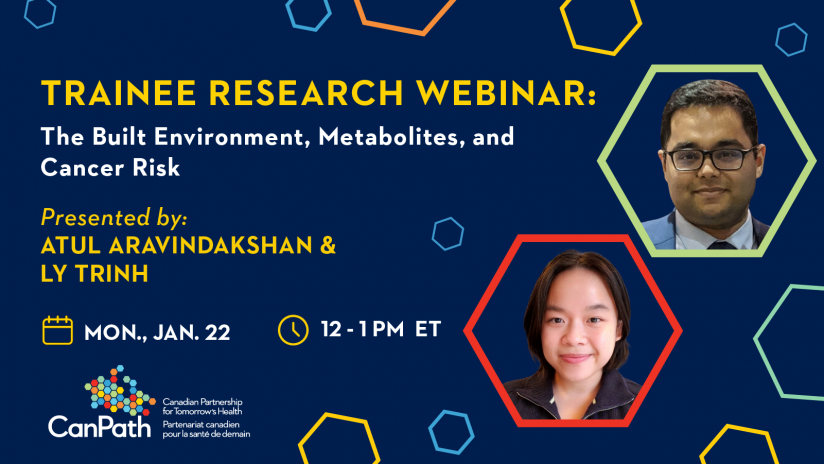Trainee Research Webinar: The Built Environment, Metabolites, and Cancer Risk

About the trainee research webinar
Discover the environmental and metabolomic dimensions of cancer risk in this trainee research webinar featuring two graduate students from the University of British Columbia, Atul Aravindakshan and Ly Trinh. Atul’s study investigates the impact of the built environment on various cancers, while Ly focuses on predicting breast cancer risk using metabolomic data.
By utilizing the same datasets from the BC Generations Project and Alberta’s Tomorrow Project, these student-led studies exemplify the immense value of population health data for students eager to make meaningful contributions to the field of cancer research!
Download Atul Aravindakshan’s slide deckDownload Download Ly Trinh’s slide deckDownloadAbout the presenters

Atul Aravindakshan is a PhD Candidate at the University of British Columbia’s School of Population and Public Health, under the supervision of Drs. Trevor Dummer and Parveen Bhatti. He is a dentist and Master of Public Health graduate with training in epidemiological and biostatistical methods, and biomarkers. Using a longitudinal analysis, he is studying the effect of residential greenness, walkability, nighttime light, and air pollution on the risks of breast, prostate, lung, and colorectal cancers.

Ly Trinh is a Master of Science student at the University of British Columbia’s School of Population and Public Health. Her thesis project, which is under the supervision of Dr. Parveen Bhatti, investigates incident breast cancer risk from two CanPath cohorts, the BC Generations Project (BCGP) and Alberta’s Tomorrow Project (ATP). Using metabolomic data from pre-diagnostic blood samples and self-reported demographic, health history, and lifestyle risk factors, the study seeks to predict future breast cancer risk and discover associated metabolomic biomarkers.